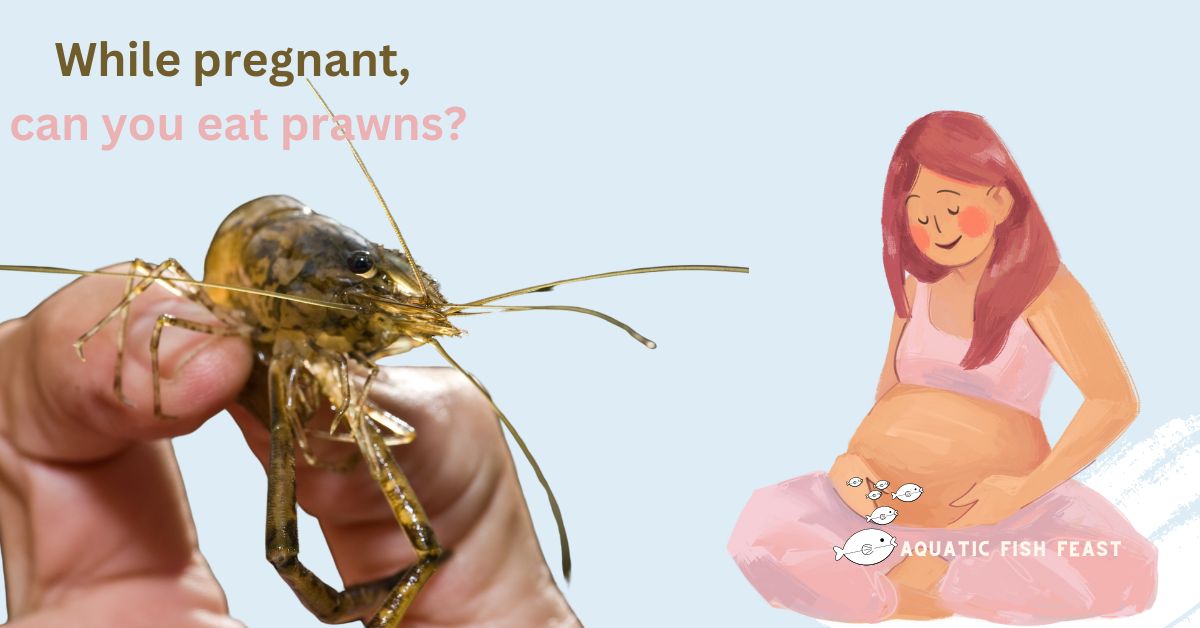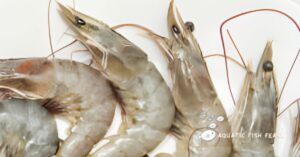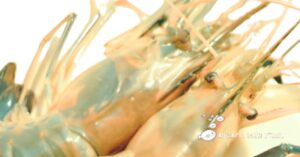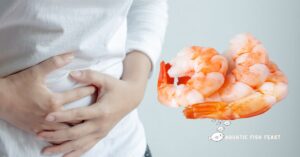Would you want to know if prawns can be eaten during pregnancy? Yes, prawns are safe to eat during pregnancy as long as they are fully cooked, based on my experience.
When prawns are cooked, they change color from grey to pinky-red.
This shows that they are safe to eat. You can also eat shrimp that have already been cooked but are cold.
They eat eight to twelve ounces of fish or shrimp every week, two or three meals.
It’s important to ensure the prawn is fully cooked. Raw prawns, such as those in sushi or sashimi, should never be eaten. It’s also helpful to know where the prawn came from.
Depending on where they were found, there may be more or less mercury in the prawns than thought.
If you want to eat crab caught in your area, the health service may know how much mercury is in the water.
If you want to learn more about the subject, keep reading.
Now, let’s get started.
Table of Contents
While pregnant, can you eat prawns?
One of the most common questions I hear from expecting moms is to know what foods are safe to eat during pregnancy.
And seafood is often what comes to their mind. Just like I said previously, let me use today to address the area of prawns specifically.
The general knowledge is that many women avoid shellfish food during the 9th month of pregnancy. This is mainly because they fear these shellfish contain more mercury and contamination.
However, some evidence suggests that prawns are safe when taken moderately as part of a balanced diet.
Shrimp have minimal mercury levels. FDA and international health organizations classify prawns as low-mercury seafood, with a weekly limit of 12 ounces, the average dish size.
Besides reducing mercury, prawns contain minerals that help mom and baby flourish. They have high-quality protein, vitamins B12, selenium, iron, and zinc.
Prawns are also a good source of iodine during pregnancy to help the baby’s brain and spine develop.
Prawns should be cooked to 145°F to kill bacteria. Food handling and preparation must follow basic food safety guidelines.
Current studies show that most healthy women with uncomplicated pregnancies can safely consume a few prawns each week.
However, if you have any special medical concerns, dangers, or limits, you should always see your healthcare professional. Choose fish with reduced mercury levels or plant-based proteins when in doubt.
Prawns may be part of a nutritious diet during the 9 months if consumed in moderation and properly prepared.
I hope this provides some reassurance to any pregnant mothers who desire the delectable crustacean.
What are the health benefits of prawns during pregnancy
Cooked prawns are packed with B vitamins, essential for energy and nervous system support, so there are many wonderful reasons to include them in your diet.
When pregnant, eating prawns can provide several advantages. Prawns might be beneficial to your pregnancy diet for the following reasons:
1. High in lean meat
Prawns are an excellent source of high-quality protein. Adequate protein is important for tissue growth, especially during the second and third trimesters when the baby’s growth accelerates.
High-quality protein, which is necessary for the growth of the baby’s muscles, tissues, and organs, may be found in plenty of prawns.
2. Encourages mental growth
Prawns contain omega-3 fatty acids essential to the developing baby’s brain. These fats can improve cognitive function and assist in the development of the baby’s nervous system.
3. Increases iron levels
Prawns contain iron, which enhances absorption when paired with vitamin C-rich foods like bell peppers.
The pregnancy-related iron shortage is frequent and can result in problems like anemia. Iron prevents anemia and maintains healthy blood formation.
Iron also helps keep you and your baby’s red blood cells healthy.
4. Immune system support
Zinc, found in prawns, is an essential nutrient that helps boost the immune system.
This can also help boost the pregnant mother’s immune system, shielding the mother and unborn child from dangerous diseases.
5. Iodine Insight
Just one serving of prawns covers over 25% of your increased iodine needs in pregnancy. Iodine is essential for baby’s brain and nervous system development. Prawns are one of the best dietary sources.
6. Promotes fetal development
In addition to protein and iodine, prawns supply selenium, vitamin B12, and omega-3 fatty acids. Prawns’ abundant nutritional composition supports the normal growth and development of the fetus.
These nutrients support the baby’s brain, spinal cord, and vision. They also help with your mood and energy levels.
Is it safe to eat crab and prawns while pregnant
Prawns and crab are popular seafood that pregnant women have mixed feelings about.
As mentioned above, properly prepared low-mercury fish and shellfish like salmon and shrimp can be part of a balanced pregnancy diet.
How do crabs and prawns stand out? Here is what you should know:
- Crab: Most crabs are mercury-free and safe to consume moderately during pregnancy. However, depending on size and location, king crab, snow crab, and Dungeness crab may have greater mercury levels. Crab should be limited to 1-2 monthly meals and smaller where feasible.
- Prawns: As discussed earlier, shrimp and prawns are nutritious and low in pollutants. According to the FDA and health groups, 12 ounces per week is safe. Prawns are an excellent 9-month seafood.
To kill germs, crab and prawns should be cooked to 145°F. When possible, select wild-caught or aquacultured over farmed.
To be more cautious like me, I would recommendation to avoid all seafood in the last 4-6 weeks of pregnancy as the fetus is most vulnerable then.
But earlier on, enjoying the occasional serving of crab or prawns prepared carefully should have little or no risk for most healthy moms-to-be. Of course, check with your health provider about any specific restrictions.
With proper handling and preparation in moderation, crab and prawns can be part of a nutritious seafood diet during pregnancy.
Note:Also, according to the FDA, frozen crab products carry a risk of food-borne disorders such as toxoplasmosis and listeriosis.
When should you stop eating seafood when pregnant
In the section above, I said prawns can be part of a healthy pregnancy diet when taken moderately.
However, if possible, seafood should be limited or avoided in the third month of pregnancy.
The FDA advises limiting seafood intake to 12 ounces or fewer per week for most varieties until the final month of pregnancy when seafood should be avoided.
The cautious recommendation reduces the danger of mercury and other pollutants accumulating late in gestation.
Why last month? At this stage, the baby is fast growing and developing. Mercury-sensitive organs, including the brain and neurological system, are also reaching completion.
After this long, in a healthy pregnancy, it’s not worth the risk.
So to summarize the recommendations:
- First trimester: Up to 12 ounces of low-mercury fish and shellfish per week is generally fine.
- Second trimester: Same limits apply. Continue enjoying prawns, salmon, etc. 1-2 times per week.
- The last 4-6 weeks of pregnancy: To be extra cautious, avoid all seafood. Switch to plant-based proteins and low-mercury fish instead.
Of course, talk to your healthcare provider about any specific restrictions or risk factors in your case.
However, following these general seafood guidelines can help ensure you and your baby get optimal nutrition safely throughout pregnancy.
Final thought
We know that prawns can be a delicious and nutritious part of a pregnant woman’s diet, but only when prepared and eaten properly.
Mercury-free prawns provide protein, iodine, and iron for mothers and infants. Proteins with high bioavailability are easier to digest during pregnancy, and their mild taste complements many dishes.
To eat prawns safely, choose smaller shrimp, cook to 145°F, and choose wild-caught types.
Prawns and other low-mercury seafood provide nutrients for growth and development for you and your child. Prepare them carefully and eat them moderately for maximum nourishment during these 9 months.
Prawns are healthy for most pregnant women but check with your doctor about any concerns.
Many doctors have advised restricting seafood intake in the final weeks of delivery.
Pâté is another item on the list of foods you should avoid.
A pâté, like smoked salmon, has a risk of listeria and is high in vitamin A, which can harm young children if consumed excessively.
Other Articles:




